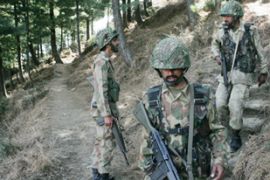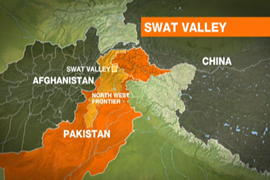Pakistani Taliban seek sharia rule
Fighters say success of peace deal depends on enforcement of Islamic law in Swat.

Published On 24 May 2008
In an exclusive interview to Al Jazeera’s Kamal Hyder, Muslim Khan, the Pakistani Taliban’s spokesman, dismissed the fear of Islamic law as US propaganda.
“They want to fight the Muslim with Muslim. Pashtun with Pashtun. Pakistani with Pakistani,” he said.
Khan’s comments came a day after he told the AFP news agency that “we have accepted to give up the armed struggle because the government has agreed to the complete enforcement of the sharia laws”.
 |
“We are happy about the agreement but the success of it depends on the conduct of the government, especially in enforcing the sharia laws,” he said on Thursday.
The same day, a senior Pakistani government official in the North West Frontier Province (NWFP) said an Islamic scholar would assist secular courts to decide on disputes according to Islamic laws.
However, a parallel mainstream judicial system will still function.
“It will be the choice of the complainant whether to go for settlement according to sharia or the Pakistan penal code,” the official said.
The 15-point peace deal also says that the fighters had agreed to shut down training camps.
Over the past years dozens of people have been killed in suicide bombings in the area.
Swat negotiations
Negotiations with fighters in Swat were launched when Pakistan’s new government came into power in February, after routing the political allies of Pervez Musharraf, the Pakistani president.
In October the Pakistan army launched a major offensive against fighters loyal to Fazlullah after they drove police and paramilitary forces from their posts in Swat.
The pro-Taliban fighters had effectively established their own law in the region.
Fazlullah is the son-in-law of another pro-Taliban figure, Sufi Mohammed, head of the Tehrik Nifaz-e-Sharia Muhammad (Movement for the Enforcement of Islamic Law), who was recently released by the Pakistan government from detention.
Mohammed controls Malakand, which is the gateway to the Swat valley.
International reaction
Jean-Marie Guehenno, the UN under-secretary general for peacekeeping operations, said on Thursday that the world will closely watch the Pakistan-Taliban deal.
“Certainly any cross-border movement is bad, is dangerous,” he said during a visit to Afghanistan.
“We will watch closely the situation in the area concerned and make sure that the situation does not deteriorate on the other side of the border.”
US, Nato and Afghan officials have criticised previous peace deals in Pakistan, saying that they have led to an increase in suicide attacks on international and Afghan forces across the border in Afghanistan.
Source: Al Jazeera, News Agencies